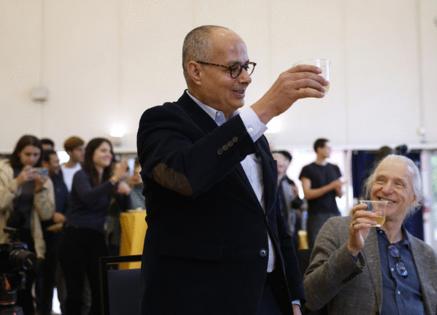Commentary: Science funding and immigration fuel America's innovation. They're at risk
Published in Op Eds
Over the course of just three days recently, five scientists affiliated with the University of California won Nobel prizes for discoveries that can help us more effectively treat conditions such as multiple sclerosis and arthritis, clean pollutants from the atmosphere, capture drinking water from desert air, and help build the world’s most powerful quantum computers.
This is a testament to more than the UC system’s research prowess. It also demonstrates America’s unmatched leadership in science and innovation, the long-standing partnership between our federal government and our universities, and our country’s ability to attract the best and brightest from around the world.
But the symbiotic relationship between the federal government and our universities — one that has delivered so much for America, its people and its economy — is now at risk.
Currently in Washington, there are plans to cut research funding by as much as 50%, threatening to cede America’s position as a leader in research to other nations, including some of our most determined competitors.
America’s global leadership in science didn’t happen by accident. It took farsighted bipartisan policies and years of investment. In 1945, Vannevar Bush, an American scientist who oversaw key research programs that contributed to Allied victory in World War II, delivered to President Truman an ambitious plan to build on the technological advances that had helped win the war and position the United States for global leadership in the modern era. His report, “Science, the Endless Frontier,” proposed a new partnership between the federal government and American universities to fund the best research, which would serve the U.S. in national defense, medicine and much more. He recognized that American universities could offer the ideal environment to advance the frontiers of knowledge. They also became a magnet to attract the best students and faculty from abroad.
Over the decades that followed, policies and investments by Republican and Democratic administrations alike have formed a bipartisan centerpiece of U.S. policy, cultivating the national research and development arm of the American economy that fuels innovation, catalyzes new industries, creates new jobs and benefits every American. With the help of federal funding, researchers at universities have made breakthroughs that are nearly impossible to fathom — from disease cures and new drugs to technological innovations like cellphones, the internet and hybrid vehicles.
Since 1945, scientists at American universities have won more than half of all Nobel prizes in physics, chemistry, medicine and economics. U.S. scientists have also published more research, been cited more often by other scientists and earned more patents than scientists from any other country.
These are exceptional scholars, recognized for making some of the world’s most important scientific contributions. But not even the world’s leading scientists and most prestigious universities can accomplish this alone. It’s only possible because of funding from the National Science Foundation, the Department of Energy, the National Institutes of Health and other federal government agencies that support research — federal funding that is now threatened.
It is also the result of policies that welcomed the world’s most talented and most promising students and faculty from around the world. Of all Nobel laureates affiliated with U.S. institutions, 35% have been immigrants. Take the example of UC Berkeley professor Omar Yaghi: He grew up in Jordan, where his father raised cattle and ran a butcher shop. At the age of 15, after his father secured a visa, he was sent to upstate New York to pursue an education. He studied English and worked hard, bagging groceries and mopping floors to pay for school. Last week, he won the Nobel prize in chemistry, the culmination of the American Dream. When our nation attracts the world’s top talent, it leads to innovation that benefits Americans, our health and the economy.
We’re already seeing the cracks in this system. The uncertainty around federal research funding over the last eight months has caused top researchers to leave prestigious positions at American institutions for opportunities in China, Canada and Europe. This “brain drain” will only continue if America doesn’t recommit to scientific research. Also, international student enrollment is down 20% this year, which means that some of the world’s most talented students are choosing to go elsewhere. And a new, expensive tax for every new post-doc or young investigator on an H1-B visa — a major source of expertise from abroad to fill unmet needs — will further restrict the talent flow.
Since 1945, America has successfully dominated scientific innovation thanks to visionary leaders, wise policy and bipartisan support for doing what is best for our country. We have been the beneficiaries of a long and successful tradition of investment in science and welcoming the best talent. Only by continuing these efforts will we ensure that the U.S. remains the leader in global discovery and progress. Without that, everything achieved for America through generations of investment and commitment is at risk.
____
James B. Milliken is the president of the UC system.
©2025 Los Angeles Times. Visit at latimes.com. Distributed by Tribune Content Agency, LLC.
























































Comments